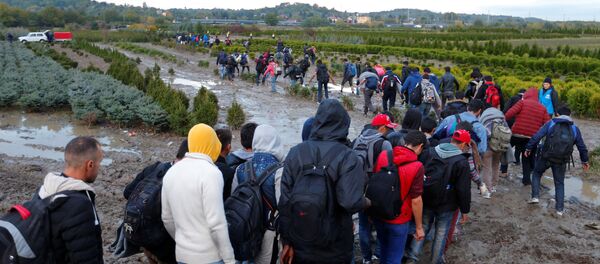The questionnaire consists of six questions about how to deal with EU policies, including the most controversial issues — the refugee crisis and the activities of foreign nongovernmental organizations (NGOs) in the country.
The beginning of the campaign, entitled "National Consultation 2017," coincided with a wave of protests which took place in Budapest on Sunday, RIA Novosti political analyst Vladimir Ardayev highlighted in his article Monday.
"Several thousand people took to the streets in the center of the Hungarian capital in support of the Central European University [CEU], run by George Soros' [Open Society] Foundations. This educational institution will be closed if the parliament adopts new amendments to the law on education," Ardayev elaborated.
Speaking to state-owned Kossuth Radio last Friday, Prime Minister Viktor Orban stated that CEU had violated regulations in awarding its diplomas. Orban underscored that the institution was enjoying an unfair advantage over other Hungarian universities.
The crux of the matter is that CEU's diplomas are accepted in both Hungary and the United States.
"There is competition among universities and it is inexplicable why we should put our own universities at a disadvantage […] while securing an unfair advantage for the foreign university," Orban told the state-run radio as quoted by Deutsche Welle.
"Cheating is cheating," Orban said, "Hungary is a sovereign country, it supports knowledge in all cases but does not tolerate cheating. Not even a billionaire can stand above the law, therefore this university must also obey the law."
If passed, the legislation will force the Soros-backed CEU out of the country, since the institution does not meet the new requirement.
Commenting on the matter, Ardayev remarked that back in the 1980s then opposition national conservative Fidesz party received support from Soros' foundation, while Orban, the present leader of the party, got an Open Society grant himself in 1989 to study politics at Oxford University.
In response to Orban's initiative thousands of students took to the streets Sunday while "over 1,000 cognitive scientists, including 2 Nobel Laureates, have signed a letter to Hungarian authorities calling on the government to withdraw the proposed legislation and maintain academic freedom and scientific excellence," CEU's official site reads.
Ardayev called attention to the fact that currently Hungary hosts more than 60 NGOs funded by Soros.
"[Hungary's] law enforcement authorities accuse them [Soros-funded NGOs] of assisting illegal migrants to enter Hungary and obtain refugee status. In January, the Hungarian government announced its intention to expel all the Soros-funded NGOs [from the country]," the Russian political analyst said.
Orban is well-known for his anti-migration views. Speaking at the recent Malta conference, the Hungarian prime minister dubbed the EU's refugee policy a "Trojan horse of terrorism."
Earlier, in February, Viktor Orban attacked Soros in his annual state of the nation speech.
"Large-bodied predators are swimming here in the waters. This is the trans-border empire of George Soros, with tons of money and international heavy artillery… It is causing trouble… that they are trying secretly, and with foreign money, to influence Hungarian politics," Orban said.
"Christians forced to leave their countries will find here the Europe they lost at home," he said.
Orban's stance on the Soros-funded University has prompted fierce criticism from the European left-leaning mainstream media.
The Guardian published an op-ed by Cas Mudde, associate professor in the School of Public and International Affairs (SPIA) at the University of Georgia, who went even so far as to claim that "the EU has tolerated Viktor Orban for too long."
"The time of accommodating Orban must end now. It has failed. It has not moderated him, as EPP leaders continue to claim," Mudde insisted, "The struggle over CEU is not just about that unique university, it is about all universities, and it is about liberal democracy."
"If we don't take a stand now, we will be fighting similar measures in Poland and other countries soon," the US scholar warned.





